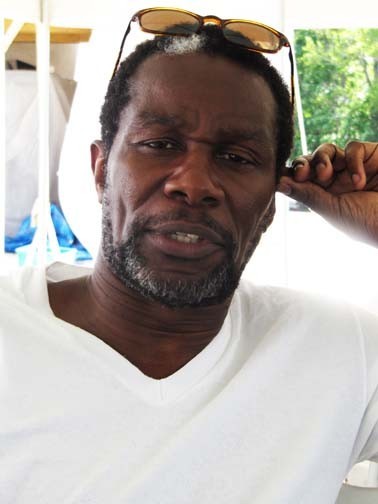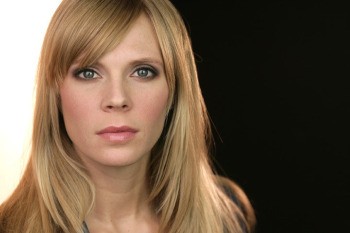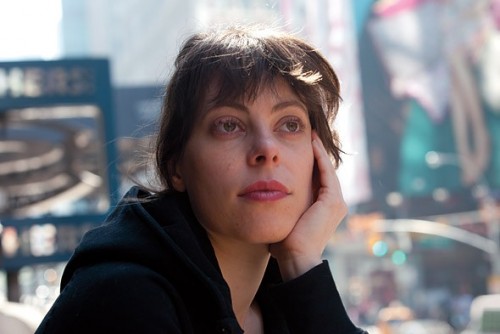John Douglas Thompson Discusses Macbeth
Finding Humanity in Their Regicide
By: Charles Giuliano - Mar 10, 2011
For the classically trained actor John Douglas Thompson intensive research and meticulous study of the text are involved in preparation for performances. Working with directors he strives to find something fresh and relevant in the characters.
When we discussed Othello, which he performed for two seasons at Shakespeare & Company, and in New York for Theatre for a New Audience, Thompson described the play as “A love story.” Later, when preparing for The Emperor Jones at the Irish Repertory Theatre in New York he described the importance of Jung as an influence on Eugene O’Neill. It informed the scenes where Jones is on the run and spooked in the forest. The demons and ghosts he wasted bullets on were performed using shadow actors and puppets.
In the past few years, since meeting in the Berkshires, we have engaged in dialogues as Thompson has been working his way through the canon. First Othello, an excursion into The Emperor Jones, Richard III, then Antony and Cleopatra, and now Macbeth. The exchanges have been intense as well as insightful. As you will note from the passage below he is insistent that I do my homework. He can also be impatient when I am slow to move off the mark of my own understanding of the works in question.
My preconceptions of Macbeth, for example, go back to English classes at Boston Latin School where we read plays by Shakespeare and were assigned to memorize lines to recite in class. In the intervening years I have seen Macbeth on video including versions by Orson Welles and Akira Korosawa. The play was given a rather awkward production last summer by Berkshire Theatre Festival.
So I have come to these dialogues with preconceptions. There was rough sledding when I came to the discussion of Richard III fixated on the paradigm of the performance by Lawrence Olivier. I had also read his book which largely informed my understanding and approach to a great actor performing Shakespeare. John offered a very different interpretation. He prevailed upon me to let go of Olivier, and a performance that is now decades old. So much has happened between then and now. I was dispatched to catch up with how our understanding of Richard has evolved and informed his performance.
Coming into a fresh dialogue about the latest work, Macbeth, which opens for previews this week at the Duke Theatre on 42nd Street, I have vowed to be a tabula rasa. To use my past acquaintance with Macbeth as a reference and book mark. To be clear for this new experience and free of the reactive mind and cluttered subconscious. This is of course a daunting challenge for one of conceit with now seven decades of life experience.
The opportunity to delve so intensively into the research, thinking process, and development of canonical roles has been truly remarkable. The intense passage transcribed below came at the end of a session of editing a preview which had been written and posted the day before. As usual, he was insistent that it be accurate. So we were correcting errors and reworking some of the quotes.
I had imagined that the editing session would take just a few minutes. During a week of tech rehearsals his time is precious. But, typically, John wanted me to understand what was wrong in my text and the reasons behind the quotes we were working on. The passage below came at the end of the session. There is a stunning sense of passion and momentum. Perhaps it was fueled by the frustration of getting me up to speed. You will note hints of apricot or bitter cherries. These are the flavors of the moment. They might have been edited, changed, and softened to create a smoother text.
In the raw form, quoted verbatim, I hope they convey to the reader the unique exchange between an actor and a critic. It makes me prepared and excited to see and review this performance. This gives me a reference of what to look for in the experience.
I sent the text to him prior to posting. We have agreed not to change a single word. Hopefully we will have another session on the Scottish Play after I review the production.
Charles Giuliano The Three Witches and sorcery are a compelling aspect of Macbeth. In the canon regarding the supernatural you pointed out the ghosts in Hamlet and Julius Caesar but there appears to be more than that going on in Macbeth. They are essential to the unique appeal of the play.
John Douglas Thompson Witchcraft is part of the play that was put in to appease King James. It’s another part of the history of the play which you don’t know about and it would be good if you read up on that. It might give you some more insight into witchcraft. James the First wrote a book and I have read some of that. It’s very dense. It’s called Demonology. It was a best seller at that time in the 1600s. Everybody bought it. Look up Demonology instead of just writing it in the article. Do a little research into it so if you are going to put it into the article it will have some basis so people won’t go back and say what is this guy talking about.
CG Regarding the passage in the play where she discusses their deceased baby I wrote about her ferocity. You insisted on changing the word to intensity.
JDT It’s not ferocity. Perhaps to the untrained eye. Everybody thinks of Lady Macbeth as some ferocious bitch. This is not the case or this doesn’t have to be the case. What she says to me (Macbeth) is what made you break this enterprise to me? She is speaking to me in Act One and saying come on we can do this.
CG What is your insight on the significance of their lost child?
JDT Yesterday I went to see The Rabbit Hole. The couple lost their child and they don’t talk about it.
CG I saw the play at the Huntington.
JDT I saw it on Broadway with the original cast. I’m not saying it’s a great play because I saw it with a bunch of psychiatrists. They were breaking it down but saying how they really liked it. There was no talk about it and no talk about having another child.
There is this thing when you lose a child the prediction is that most couples break up. Most marriages fall under the weight of that. Me (Macbeth) and my wife didn’t fall. We were strengthened and created another dream. Instead of a child the dream was let’s be king and queen. Let’s have that. Let’s work toward that goal. Let’s achieve that. And then perhaps we’ll think of having another child. So that’s why bringing up a child at that point in time is so incredible and remarkable.
“What beast was't, then,
That made you break this enterprise to me?
When you durst do it, then you were a man;
And, to be more than what you were, you would
Be so much more the man. Nor time nor place
Did then adhere, and yet you would make both:
They have made themselves, and that their fitness now
Does unmake you. I have given suck, and know
How tender 'tis to love the babe that milks me:
I would, while it was smiling in my face,
Have pluck'd my nipple from his boneless gums,
And dash'd the brains out, had I so sworn as you
Have done to this”
It’s something we just haven’t talked about because it’s too painful. So we made a choice to not talk about it. For her to bring it up at that point let’s me know how important this thing is to her. (Seizing the throne.) It’s not a manipulative thing. It’s how important my love to you is. If I had made a commitment I would kill the baby if it meant that I had to break the commitment.
That’s how strong it is and why Macbeth realizes how much his wife loves him. At that moment. So it’s not two bad people or a ferocious woman. A bitch. We have to move off of that place. Or we give the actors so limited an opportunity to create new stuff. We reduce Shakespeare and this great writing to the least common denominator. That is not interesting.
How many times do you want to see a bitch on stage? How many times do you want to see somebody just incarnately evil on stage? They have to have a conscience. They have to have some humanity. They have to have a dream. They have to have love. They have to have these other things.
Go talk about any serial killer. People knew him when he was a kid. He took out the garbage. He helped his mom. I don’t understand how all this happened. We never have the answers. We can’t say oh he was evil from the beginning. He was killing spiders and all that stuff as a child. He was just a bad guy. No, that’s not how it works. In the human race.
That’s why I try to encourage you to move from that place and open yourself to the infinite possibilities that can be suggested here. If anything, as a performer, that’s what I’m trying to do. To open your eyes to the infinite possibilities.
You don’t have to like what I do. I’m just presenting an option to expand the discussion. To expand the debate. I don’t want to do what somebody else did. Oh, he’s evil. He killed the king so he’s a bad guy. What latitude or liberty does that give me as an actor? That I have to follow in that footstep, particularly if it doesn’t make sense to me. Or if it doesn’t really jibe with what is going on inside of me. Then I’m a tool. I become a tool serving something for someone else. There are so many actors and so many ways to interpret these plays. We have to come to them and say what is he going to do with this one? What will he say about this? The last person said this. So I want to see what this person says.
CG Do you ignore and block out all of the other interpretations?
JDT No, I think about them. If there were things in other interpretations which were good I try to use them myself. I try to make them my own.
CG Do you look at the films?
JDT Not all the time. Sometimes I do as a part of the research. I feel there are other people who have made and built the wheel. Maybe they have done it better than me and I can learn something from that building of the wheel.
CG Did you see Kurosawa’s Throne of Blood?
JDT Yes, a long long time ago. I liked it but that painted the wife as really a ferocious bitch. I don’t necessarily agree with that. It’s a good interpretation but I don’t necessarily agree with that. You have to care about these people. You really have to care about them. As they are going through this thing you care about them. You say, Oh my God. Look what it’s doing to them. Look what it’s done to their relationship. It’s torn them apart. I cared about these guys. I knew they were doing something wrong but maybe they would have gotten away with it. Maybe at the last minute they would decide not to do it. But they did it. Now they’re paying a price for it. If you don’t say, damn, that could be me. I’ve made bad choices in my life. You watch these people fall. From grace. Which is where they were before all this happened. Then what’s the point of doing this play? It becomes an exercise in mediocrity. To show you two bad people and what happened is a morality play. This is what happens to bad people so don’t do anything bad.
CG In Olivier’s book he stated that an actor has to love the character he is portraying.
JDT Absolutely. I’ve loved all of my characters. I loved The Emperor Jones.
CG Do you love Macbeth?
JDT I love Macbeth he’s a morally conscious man. He’s got an ambition and he’s got a really incredible imagination. He was one of those men who was before his time and couldn’t express himself in a way that he gets to express himself in this play. I can imagine this guy listening to classical music and enjoying the finer things in life. He understands culture. I look at him as a renaissance man. And a warrior.
CG Can you make me love you?
JDT I don’t know if I can make you love me.
CG When I am a member of the audience can I perceive that aspect of your character? Can I come to love your character in the way that you do?
JDT That I don’t know. I’m not making statements that this is what is going to happen. What I hope happens is that you can see your own humanity. In Macbeth. And that’s great. Shakespeare wrote these characters. They come from us and they are human beings. If we can see ourselves in them then there has been an accomplishment.
CG In what sense is that a new interpretation? Is that stepping out from a traditional take on the role?
JDT No I don’t think I’m saying that’s a brand new interpretation. I’m saying there are aspects of the production that add to, maybe that is a different interpretation. The hope is that you can look at this play, in its totality, and see your own humanity. In Lady Macbeth, in Mr. Macbeth, in Duncan. That in these characters you can see swatches of yourself. Now is that a new interpretation? I don’t really know. But the hope is to see our humanity reflected so we can go on a journey with these people. I’m not saying that’s a new interpretation. That’s the hope of a new production.




